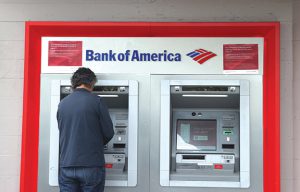Bloomberg
Investors are piling into cash as the outlook for global growth drops to an all-time low and stagflation worries mount, according to a Bank of America Corp (BofA) fund manager survey that points to continued stock-market declines.
Cash levels among investors hit the highest level since September 2001, the report showed, with BofA describing the results as “extremely bearish.†The survey of investors with $872 billion under management also showed that hawkish central banks are seen as the biggest risk, followed by a global recession, and stagflation fears have risen to the highest since 2008.
The results make for grim reading for global equities, which have already suffered the longest weekly losing streak since the global financial crisis as central banks turn off the monetary taps at a time of stubbornly high inflation. While equities have seen a small rebound as valuations get more attractive, strategists including Michael Wilson at Morgan Stanley say more losses lie ahead.
In the BofA report, strategist Michael Hartnett said investors believe stocks are prone to an imminent bear market rally, but ultimate lows have not yet been reached. With investors expecting more rate hikes from the Federal Reserve, the market isn’t yet at “full capitulation,†Harnett wrote in the note.
Fears of a recession trumped the tail risks from inflation and the war in Ukraine, BofA’s survey showed. The bearishness has been extreme enough to trigger BofA’s own buy signal, a contrarian indicator for detecting entry points into equities. Strategists such as Kate Moore at BlackRock Inc. and Marko Kolanovic at JPMorgan Chase & Co. have also suggested that concerns of an imminent recession are overblown.
The BofA survey also showed that technology stocks are in the biggest “short†since 2006. Frothy tech shares have been particularly punished in the latest selloff amid concerns about future earnings as rates rise.
bank of america Scales Back on SPAC Work
Bank of America Corp scaled back work with some SPACs, part of a retreat by banks including Goldman Sachs Group Inc. and Citigroup Inc. from blank-check firms over concern about potential liability risks associated with the vehicles.
The Charlotte, North Carolina-based lender ended its relationships with some of the special purpose acquisition companies it helped take public while reviewing its policies for working with such vehicles, according to people familiar with the matter. The bank has been in discussions with clients on navigating the current environment and is continuing selective work with some deals.
Bank of America is concerned about sweeping new guidelines from the Securities and Exchange Commission that would expose underwriters to greater liability risk, the people said. Goldman is also pulling out of working with most SPACs it took public because of the proposed SEC rules, Bloomergg News reported.
Citigroup paused initial public offerings of new US SPACs until it gets more clarity on the potential legal risks posed by the guidelines, Bloomberg reported last month.
At Bank of America, the situation is fluid and policies could change — with the potential for further pullback — depending on the outcome of the regulatory proposals, the people said.
Together, Bank of America, Citigroup and Goldman accounted for more than 27% of US SPAC deals since the start of last year, overseeing about $47 billion of the transactions, according to data compiled by Bloomberg.
The pullback by Bank of America and other Wall Street giants poses a risk to sponsors of SPACs that are already public. SPACs, also known as blank-check firms, list on public stock exchanges to raise money so they can buy other companies. A SPAC works with its adviser even after going public to complete its merger with a target firm, known as the de-SPAC transaction. If it fails to complete that deal, it’s forced to return capital to investors.
SPACs were the hottest toy on Wall Street over the past couple of years, drawing financiers, politicians and celebrities, who were able to make easy millions from investors piling into the investment vehicles. The new SEC guidelines have helped put an end to the party. US lawmakers and investor advocates have argued that blank-check listings were bypassing rules imposed on traditional IPOs and exposing retail shareholders to extra risks.
The SEC’s proposal would require SPACs to disclose more information about potential conflicts of interest and make it easier for investors to sue over false projections. Even before the draft rules were announced, souring markets and the plunging shares of prominent companies that went public by merging with blank-check firms had cast a chill on the market.
 The Gulf Time Newspaper One of the finest business newspapers in the UAE brought to you by our professional writers and editors.
The Gulf Time Newspaper One of the finest business newspapers in the UAE brought to you by our professional writers and editors.
